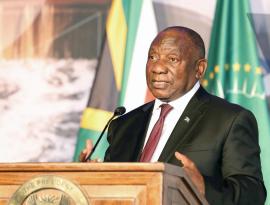
The need for an urgent and high-level national turnaround plan on water security that is aligned to the Government of National Unity’s Medium-Term Development Plan 2025 to 2029, has been underscored by President Cyril Ramaphosa.
The President made the call during the Water and Sanitation Indaba, currently underway at the Gallagher Convention Centre in Midrand, Gauteng.
“What is needed is an urgent and high-level national turnaround plan on water security that is firstly aligned to the Government of National Unity’s Medium-Term Development Plan 2025 to 2029, and secondly, that harnesses the momentum of the reforms in the sector," said the President.
Delivering his keynote address at the opening of the two-day Indaba on Thursday, President Ramaphosa noted that Operation Vulindela has prioritised reforms in the water sector to improve water quality, to catalyse investment in the construction and maintenance of water infrastructure and strengthen regulation in the sector.
“Under the sixth administration we reinstated the drop water quality monitoring system as an important incentive. These reports are particularly important in area where water resources are key to the tourism, agriculture, and other sectors,” President Ramaphosa said.
As part of the structural reform process in the water sector, the President said government has been able to significantly reduce the turnaround time for the issuing of water use licenses, with 75% of applications being currently processed within 90 days.
“An additional 110 technical and scientific staff have been hired to support further process improvements. Last year we published the Raw Water Pricing Strategy as part of promoting efficient water management, and following a process initiated in 2022 under Operation Vulindlela.
“This will be key to promoting transparency around how raw water is priced in the country and will contribute towards instilling business and investor confidence. Creating an enabling legal and regulatory framework for water stewardship is a priority,” he said.
Interventions
The President added that through the Water Services Amendment Bill the country will introduce a licensing system for water service providers and remove licenses where providers do not meet the standards for quality drinking water.
He added that by next year government hopes to finalise the establishment of the National Water Resource Infrastructure Agency, “one of the most significant reforms coming to the sector to date.”
“This new agency will bring strategic alignment, consistency and accountability to the various institutional arrangements for water stewardship that have to date proven to be less than ideal,” he said.
The President also highlighted a number of strategic interventions implemented to enhance the delivery of water services in municipalities and support them to address their water and sanitation challenges.
Among the interventions include sustained progress in the Presidential eThekwini Working Group in KwaZulu-Natal.
He said the ongoing oversight work of the Presidential Water Task Team will augment these efforts.
Collaboration
President Ramaphosa also emphasised that resolving the country’s water and sanitation challenges necessitates deepened collaboration between all stakeholders in the water resources management ecosystem.
He underscored a need for greater cooperation between national and provincial government, including the water resource management entities, and the private sector to support the turnaround in water stewardship.
“Much of this focus must be on supporting service delivery at local government level, where it matters most. Structural reforms in the water sector, as vital as they are, cannot be effectively implemented without local government being strengthened.
“Municipalities are not effectively leveraging the likes of the Urban Settlements Development Grant, Municipal Infrastructure Grant, and other ring-fenced financial resources to improve the provision of these services in their localities. For its part, local government leadership needs to prioritise turnaround strategies for their respective Water Services Authorities.
“This Indaba must not become an exercise of problem-diagnosing: the challenges are well-known. What is needed is course correction - and comprehensive plan that will expand access to water and sanitation services, improve the quality of water and sanitation infrastructure, and bring stability and good governance to all the entities involved in South Africa’s water stewardship,” the President said. – SAnews.gov.za


